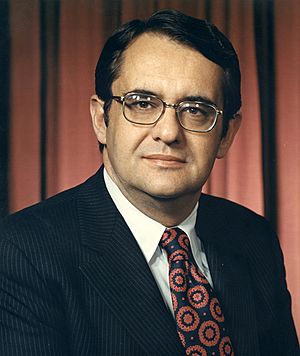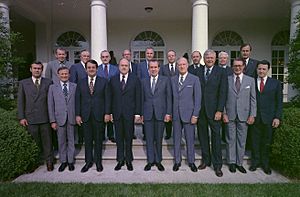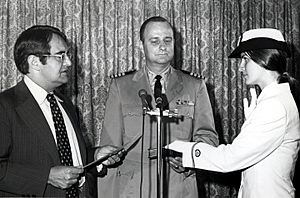Peter G. Peterson facts for kids
Quick facts for kids
Peter G. Peterson
|
|
|---|---|
 |
|
| Chairman of the Council on Foreign Relations | |
| In office September 1, 1985 – June 30, 2007 |
|
| Preceded by | David Rockefeller |
| Succeeded by | Carla Hills Robert Rubin |
| 20th United States Secretary of Commerce | |
| In office February 29, 1972 – February 1, 1973 |
|
| President | Richard Nixon |
| Preceded by | Maurice Stans |
| Succeeded by | Frederick B. Dent |
| Personal details | |
| Born |
Peter Petropoulos
June 5, 1926 Kearney, Nebraska, U.S. |
| Died | March 20, 2018 (aged 91) New York City, U.S. |
| Political party | Republican |
| Spouses |
Kris Krengel
(m. 1948; div. 1950)Sally Hornbogen
(m. 1953; div. 1979) |
| Children | 5, including Holly |
| Education | Northwestern University (BA) University of Chicago (MBA) |
Peter George Peterson (June 5, 1926 – March 20, 2018) was an important American businessman and government official. He was known for his work in finance and for serving as the United States Secretary of Commerce under President Richard Nixon.
Peterson also helped start a big investment company called The Blackstone Group. He was also the head of the Council on Foreign Relations, which is a group that studies how the U.S. interacts with other countries. Later in his life, he created a foundation to help people understand the country's financial health.
Contents
Early Life and Education
Peter Peterson was born in Kearney, Nebraska, in 1926. He was the oldest of three children. His parents, Venetia and George Peterson, had moved to the United States from Greece.
His father, George, came to the U.S. when he was 17. He worked hard, even washing dishes for a railroad company. In 1923, George opened a Greek diner called Central Café in Kearney. Peter started helping out at the diner's cash register when he was only 8 years old.
Peter went to Northwestern University and graduated with top honors in 1947. He later earned a master's degree in business (an M.B.A.) from the University of Chicago Booth School of Business in 1951.
Starting His Business Career
After college, Peter Peterson first worked at a market research company in Chicago. In 1953, he joined an advertising company called McCann Erickson.
He then moved to Bell and Howell Corporation in 1958. This company made movie equipment. He became the chairman and CEO (Chief Executive Officer) of Bell & Howell in 1963 and stayed in that role until 1971.
In 1969, Peter Peterson was asked to lead a special group called the Peterson Commission. This group looked at how non-profit organizations (foundations) should use their money. One of their ideas, which became a rule, was that foundations should give away a certain amount of their money each year.
Serving as Secretary of Commerce
In 1971, U.S. President Richard Nixon asked Peter Peterson to be his assistant for international economic affairs. This meant he would help the president with money matters between the U.S. and other countries.
Peterson wrote a secret report for President Nixon. The report suggested that the U.S. economy was facing challenges compared to other countries. He believed the U.S. needed to change its trade rules to stay competitive. This report helped lead to some big changes in how the U.S. handled its international trade.
In 1972, he became the United States Secretary of Commerce. This is a very important job where he helped manage business and trade for the country. He held this position for about one year. During this time, he often spoke about his concerns about the United States' growing financial debt.
After His Government Role
After working for the government, Peter Peterson became the chairman and CEO of Lehman Brothers, a well-known financial company, from 1973 to 1984.
In 1985, he teamed up with Stephen A. Schwarzman to create a new company called The Blackstone Group. This company invests in other businesses. Peterson was the chairman of Blackstone for many years. When Blackstone became a public company in 2007, Peterson earned a lot of money, which he later used for charity.
Later Career and Philanthropy
In 1985, Peter Peterson also became the chairman of the Council on Foreign Relations. He stayed in this role until he retired in 2007. This group helps people understand global issues and U.S. foreign policy.
He also helped start the Peterson Institute for International Economics, which studies global economic issues. The institute was named after him in 2006. From 2000 to 2004, he was also the chairman of the Federal Reserve Bank of New York, which is a very important part of the U.S. financial system.
In 2008, he started The Peter G. Peterson Foundation. This foundation works to teach people about the national debt and other important money issues facing the country. He also helped fund The Fiscal Times, a website that shares news about economic topics.
In 2010, Peter Peterson joined "The Giving Pledge." This is a promise made by many billionaires, like Bill Gates and Warren Buffett, to give away at least half of their money to charity. Most of Peterson's donations went to his own foundation.
Political Views
Peter Peterson was a member of the Republican Party. However, he sometimes disagreed with his party, especially about government spending. He was worried about the country's debt.
In 1992, he helped create the Concord Coalition. This group works to reduce the U.S. government's debt. He also spoke out against some tax cuts in 2017. He believed these cuts would increase the national debt too much.
Personal Life
Peter Peterson was married three times. In 1980, he married Joan Ganz Cooney, who helped create the famous children's TV show Sesame Street. He had five children, including his daughter Holly Peterson, who is a writer.
Peter Peterson passed away on March 20, 2018, in New York City. He was 91 years old. He was remembered for his long career in business and government, and for his efforts to raise awareness about the country's financial future.
Honors and Awards
- In 1962, he received the Golden Plate Award from the American Academy of Achievement.
- The Peterson Institute for International Economics was named in his honor in 2006.
- In 2006, he received the Woodrow Wilson Award for Corporate Citizenship.
- He was elected as a fellow of the American Academy of Arts and Sciences in 2006.
Writings
- "Why I’m Giving Away $1 Billion", Newsweek, May 30, 2009
- "You Can't Take It with You", Newsweek, April 7, 2008
- "Old habits must change", The Banker, 3 January 2005
- Articles published in "Foreign Affairs" 1994–2004.
Books
- Facing Up: How to Rescue the Economy from Crushing Debt and Restore the American Dream. Simon & Schuster; First Edition (November 8, 1993). ISBN: 978-0-671-79642-6
- Will America Grow up Before it Grows Old: How the Coming Social Security Crisis Threatens You, Your Family and Your Country. Random House; 1 edition (October 8, 1996). ISBN: 978-0-679-45256-0
- Gray Dawn: How the Coming Age Wave Will Transform America—and the World. Three Rivers Press (September 26, 2000). ISBN: 978-0-8129-9069-0
- On Borrowed Time: How the Growth in Entitlement Spending Threatens America's Future with Neil Howe. Transaction Publishers (May 1, 2004). ISBN: 978-0-7658-0575-1
- Running on Empty: How the Democratic and Republican Parties Are Bankrupting Our Future and What Americans Can Do About It. Picador (June 16, 2005). ISBN: 978-0-312-42462-6
- The Education of an American Dreamer: How a Son of Greek Immigrants Learned His Way from a Nebraska Diner to Washington, Wall Street, and Beyond. Twelve (June 8, 2009). ISBN: 978-0-446-55603-3
 | John T. Biggers |
 | Thomas Blackshear |
 | Mark Bradford |
 | Beverly Buchanan |



